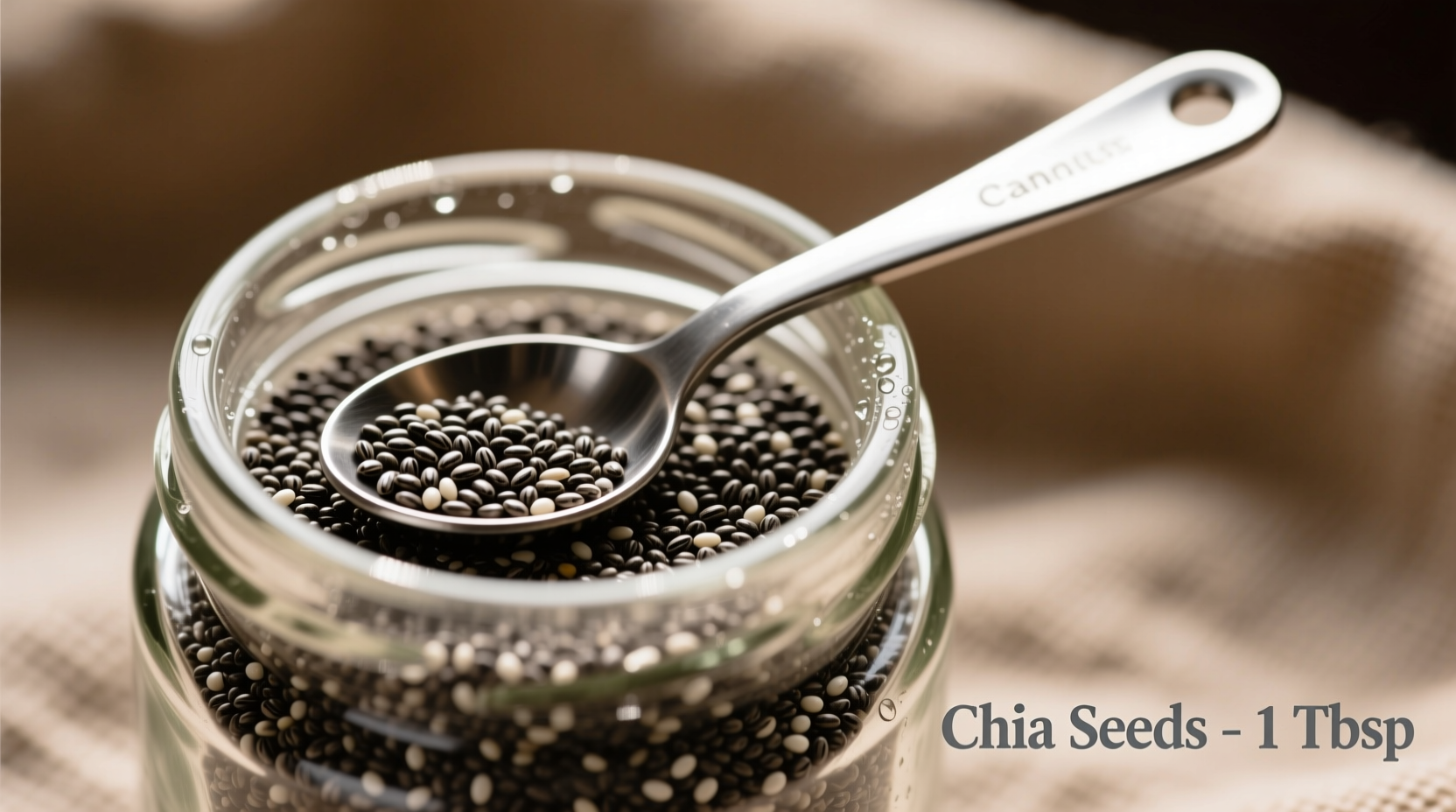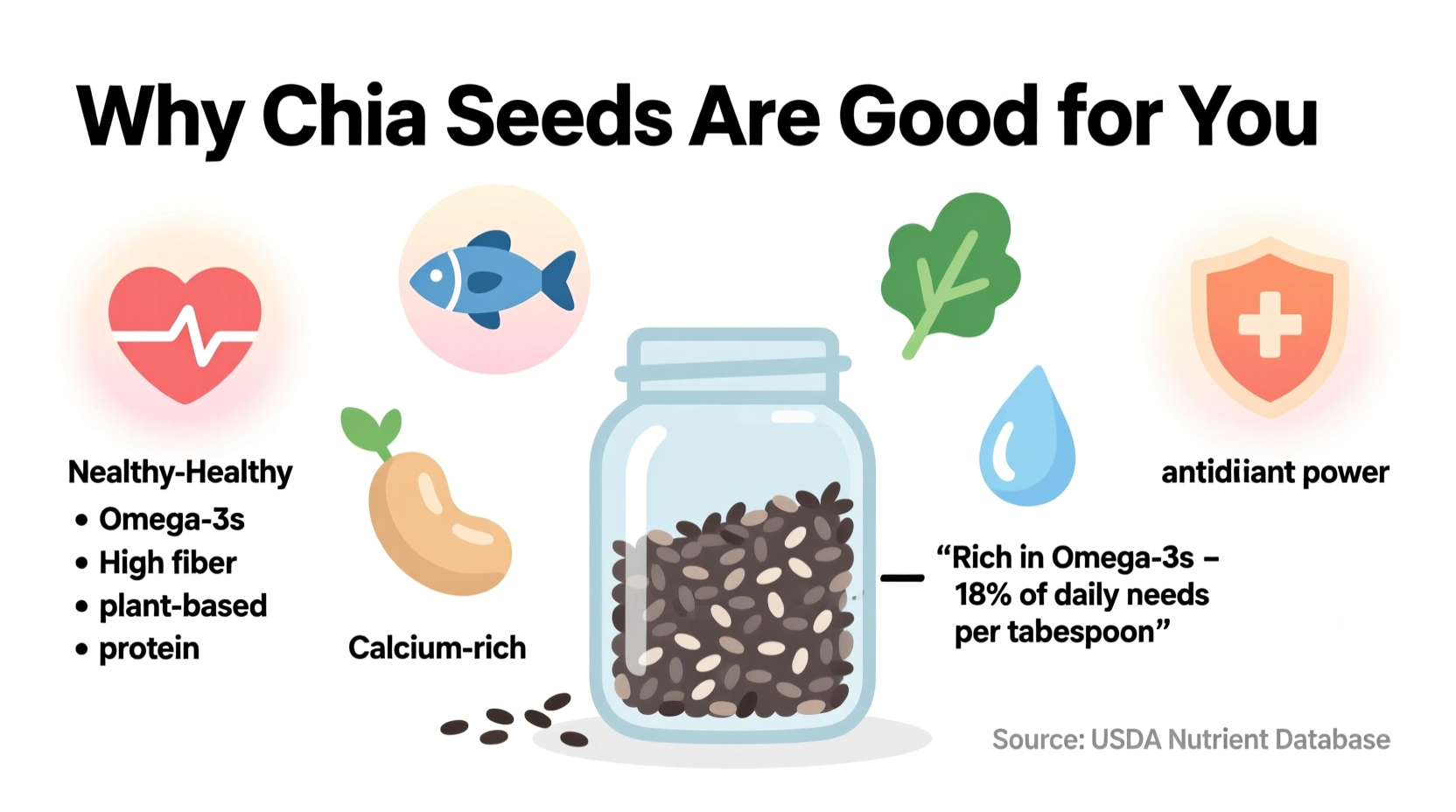The Complete Science-Backed Guide to Chia Seed Benefits
When you sprinkle chia seeds into your morning smoothie or overnight oats, you're tapping into a nutritional powerhouse with roots in ancient Central American civilizations. Modern research confirms what Aztec warriors knew centuries ago - these tiny seeds provide remarkable health advantages when incorporated properly into your diet.
What Makes Chia Seeds Nutritionally Unique
Unlike many so-called "superfoods," chia seeds deliver measurable nutritional density. A single ounce (28 grams) contains:
| Nutrient | Amount per Ounce | Daily Value % |
|---|---|---|
| Calories | 138 | 7% |
| Fiber | 10g | 34% |
| Omega-3 Fatty Acids | 5g | 303%* |
| Protein | 5g | 11% |
| Calcium | 180mg | 18% |
*Based on 1.6g daily ALA omega-3 recommendation from National Institutes of Health
This complete nutritional profile explains why chia seeds consistently outperform other popular seeds in head-to-head comparisons. Unlike flaxseeds, chia seeds don't require grinding to access their nutrients and maintain stability without refrigeration.
How Chia Seeds Specifically Improve Heart Health
The American Heart Association recognizes omega-3 fatty acids as essential for cardiovascular wellness. Chia seeds contain alpha-linolenic acid (ALA), the plant-based omega-3 that directly contributes to heart health through multiple mechanisms:
- Reduces triglyceride levels by up to 30% according to a 2012 NIH study
- Lowers LDL cholesterol while maintaining HDL levels
- Helps regulate blood pressure through potassium and magnesium content
- Provides anti-inflammatory effects that protect arterial walls
Researchers at the University of Toronto found that consuming just 37 grams of chia seeds daily significantly improved cardiovascular risk factors in patients with type 2 diabetes - results published in Diabetes Care.

Stabilizing Blood Sugar Through Fiber Science
Chia seeds' remarkable ability to absorb 10-12 times their weight in water creates a gel-like substance that slows carbohydrate digestion. This physical property delivers concrete blood sugar benefits:
- Reduces post-meal blood sugar spikes by 39% according to research in Plant Foods for Human Nutrition
- Improves insulin sensitivity in prediabetic individuals
- Creates sustained energy release throughout the day
- Helps prevent sugar cravings through prolonged satiety
This makes chia seeds particularly valuable for people managing diabetes or insulin resistance. The soluble fiber forms a physical barrier that slows sugar absorption into the bloodstream.
Digestive Health Benefits Backed by Gut Research
With 10 grams of fiber per ounce - more than double what most adults consume daily - chia seeds significantly impact digestive wellness. But it's not just about quantity:
- Soluble fiber content (about 6g per ounce) feeds beneficial gut bacteria
- Insoluble fiber promotes regular bowel movements
- Prebiotic properties support microbiome diversity
- Natural mucilage soothes intestinal lining
A comprehensive review in the Journal of Food Science and Technology confirmed chia seeds' role in improving stool frequency and consistency, particularly for individuals with occasional constipation.
Practical Incorporation Strategies for Maximum Benefit
To experience these health advantages, proper preparation matters. Here's how to maximize chia seed benefits:
Daily Consumption Guidelines
- Start with 1 tablespoon daily to assess tolerance
- Gradually increase to 2 tablespoons (about 1 ounce) as your system adjusts
- Always consume with adequate water (at least 8 ounces per tablespoon)
- Avoid dry consumption to prevent potential choking hazards
Optimal Preparation Methods
- Overnight chia pudding: Mix 3 tablespoons with 1 cup milk (dairy or plant-based)
- Smoothie thickener: Add 1-2 tablespoons to fruit smoothies
- Egg substitute: Combine 1 tablespoon seeds with 3 tablespoons water (let sit 5 minutes)
- Salad topper: Sprinkle on greens for crunch and nutrition
Important Considerations and Limitations
While chia seeds offer significant health advantages, certain individuals should exercise caution:
| Consideration | Recommendation |
|---|---|
| Swallowing difficulties | Avoid dry consumption; always pre-soak |
| Blood thinning medications | Consult physician due to omega-3 content |
| Irritable bowel syndrome | Start with small amounts (1 teaspoon) |
| Seed allergies | Complete avoidance recommended |
Quality matters too - choose organic, non-GMO chia seeds from reputable suppliers to avoid potential pesticide residues. Proper storage in a cool, dark place maintains freshness for up to two years.
Understanding Chia Seeds' Scientific Evolution
Chia seeds have moved from ancient staple to modern superfood through rigorous scientific validation:
- 2000+ years ago: Aztec and Mayan civilizations used chia as staple food and medicine
- 1990s: Modern rediscovery begins with agricultural research in South America
- 2009: FDA approves chia as "generally recognized as safe" (GRAS)
- 2010s: Multiple clinical trials validate health benefits for heart health and blood sugar
- Present: Incorporated into dietary guidelines by nutrition authorities worldwide
This scientific journey demonstrates how traditional knowledge has been validated through contemporary research methods - a rare example of ancient wisdom meeting modern nutritional science.
Realistic Expectations for Chia Seed Benefits
While chia seeds deliver impressive nutritional value, they're not magic bullets. For optimal results:
- Combine with balanced diet rather than expecting standalone effects
- Allow 4-6 weeks of consistent consumption to notice digestive improvements
- Pair with regular exercise for cardiovascular benefits
- Track your personal response through food journaling
Remember that individual responses vary based on overall health status, dietary patterns, and genetic factors. What works dramatically for one person may show more subtle effects for another.
Final Practical Takeaway
Adding chia seeds to your diet represents one of the simplest, most evidence-backed nutritional upgrades you can make. Their unique combination of complete protein, omega-3s, and fiber delivers measurable health improvements when incorporated properly. Start with small amounts, stay hydrated, and track how your body responds to unlock these ancient seeds' modern health potential.











 浙公网安备
33010002000092号
浙公网安备
33010002000092号 浙B2-20120091-4
浙B2-20120091-4